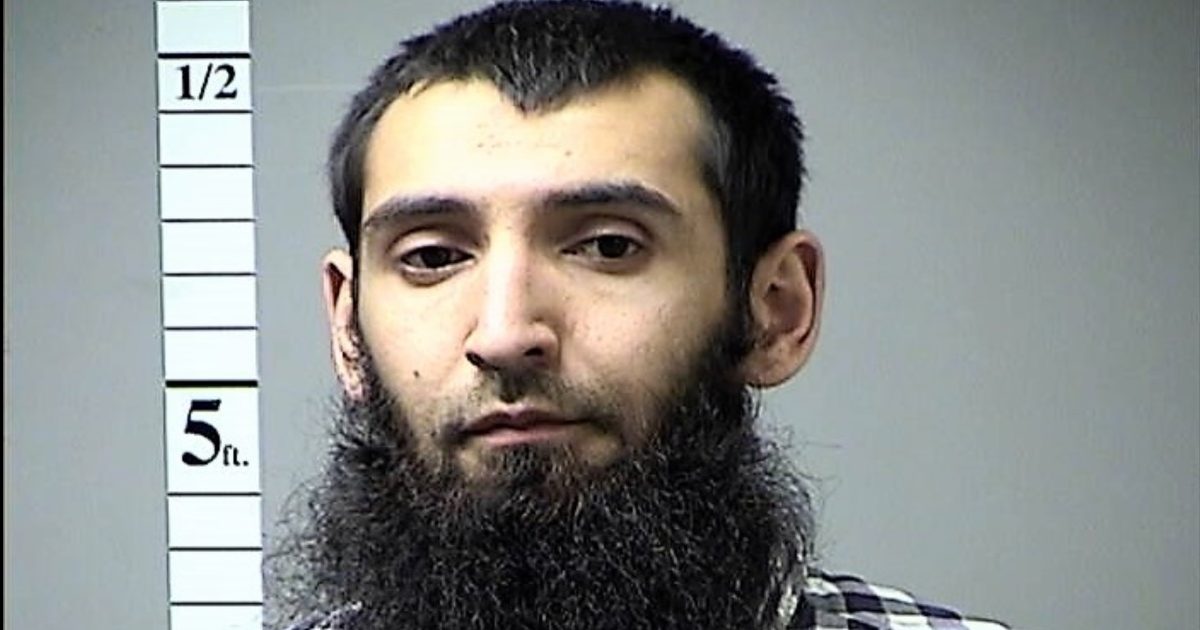
Sayfullo Saipov (Image via Mugshot Handout/Getty Images.)
In a rare death penalty trial in Manhattan, a federal jury will decide whether to execute the man convicted of using a Home Depot rental truck as a weapon of terrorism in 2017.
“He is proud of what he has done”
More than five years ago on Halloween, Sayfullo Saipov drove the rental truck off the West Side Highway onto a bicycle and pedestrian greenway. The attack killed eight people and wounded 12. The truck stopped after crashing into a special-needs school bus.
“The defendant Sayfullo Saipov committed a brutal terrorist attack in this city for ISIS,” Assistant U.S. Attorney Amanda Leigh Houle told a jury.
With the fact-finding portion of the trial over, the prosecutor said that the penalty phase will focus on the victims’ torment: “Their minds are still haunted, terrorized by facing death and watching others die. And this was all part of the defendant’s plan.”
“It’s what he wanted, and he is proud of what he has done,” Houle added, adding that Saipov “has not abandoned his jihad, his fight.”
As he got out of the truck, Saipov was heard shouting “Allahu akbar,” Arabic for “God is great.” Law enforcement shot him at the scene, before taking him to Bellevue Hospital for medical treatment. Saipov did not hide his motivation for the attack: the Islamic State group, whose flag he reportedly asked to wave inside his hospital room.
Authorities say they found numerous pieces of evidence linking the attack to ISIS, including a document with a saying acolytes use to refer to the group: “It will endure.”
“Cell phones recovered from the Truck contained, among other things, videos and images of ISIS propaganda, and internet searches for truck rentals and for Halloween in New York City,” the Justice Department said.
Though the jurors have learned about Saipov’s actions, the prosecutor said: “You have not yet learned about the depths of that sorrow — about how the defendant forced one mother to hold her daughter and watch her die on that bike path.”
One of the victims, 31-year-old Ann-Laure Decadt, had a 3-month-old son, and Houle noted that this child would not have a “single memory of his own mother’s face.” Several of Saipov’s surviving victims also will testify, the prosecutor said.
“Choose life”
Before proceedings began, Saipov’s attorney David Patton, who leads the Federal Defenders of New York, urged the judge to tell jurors not to speculate about what the victims would want as a sentence for the defendant.
“A majority of the victims were in favor of or did not oppose a plea to a life sentence, and one of the deceased victims expressed her opposition to the death penalty before she was killed,” Patton wrote in a two-page letter. “Thus, particularly where many victims do not actually support executing Mr. Saipov, it is appropriate to remind jurors that they should avoid speculating about the outcome desired by each victim witness not only because it is irrelevant to their deliberations, but also because their assumptions could be wrong.”
Patton’s co-counsel, David Stern of the firm Rothman, Schneider, Soloway & Stern, LLP, said that the jury has a choice few ever will have to make: “whether or not a fellow human being will live or die.”
“He will die in jail,” the attorney said. “The only remaining question is when.”
Throughout his presentation, Stern showed photographs of Saipov with his family of immigrants from Uzbekistan. Former President Donald Trump pointed to the Saipov family’s national origin to advocate for restricting immigration, but Stern said that his client had an unlikely trajectory to his crimes. He was a loved and valued member of the family, as a first-born son and first-born grandson.
Stern did, however, note that ISIS recruits from Uzbekistan because of the former Soviet satellite’s harsh repression of religious minorities. In the United States, Saipov could encounter an “unfettered internet,” making him susceptible to the group’s propaganda, the attorney said.
“He was ill-equipped to recognize it for what it really was,” Stern said.
Asking the jury to reject the notion that “death begets death,” Stern said: “We will say that the cycle of death has to end somewhere.”
Urging the jury to say “enough,” Stern asked them to “choose life.”
If they do so, Stern said, that judgment would resound with the message: “We will not be like him. We will have a civilized sense of justice.”
New York abolished the death penalty in 2004, but capital punishment is still available in federal courts.
The New York Times reported that the last federal execution in the Empire State was imposed nearly seven decades ago in 1954, with bank robber Gerhard A. Puff, who killed an FBI agent. The paper noted that Saipov’s family hails from Uzbekistan and two of his victims are from Belgium and Argentina, all countries without capital punishment.
U.S. District Judge Vernon S. Broderick instructed the jury that they must unanimously choose the death penalty to send Saipov to his execution.
Have a tip we should know? [email protected]